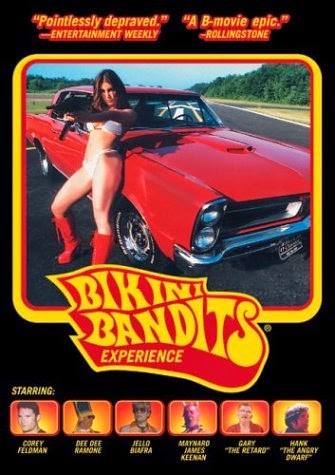Title: I Am Divine
Director: Jeffrey Schwarz
Released: 2013Starring: Divine / Glen Harris Milstead, John Waters, Tab Hunter, Ricki Lake, Mink Stole, George Figgs, Bruce Vilanch, Lisa Jane Persky, David DeCoteau, Susan Lowe, Mary Vivian Pearce, Edith Massey, David Lochary
Plot: Documentary charting the life of legendry drag
performer Divine, from his early start in the films of his best friend John
Waters to his rise as a national phenomenon as he became an off Broadway star, disco
queen and cult cinema icon through to his premature death at age 42.
Review: Unquestionably one of the most iconic characters in
Cult cinema, Divine might be best known for the films he made with best friend
John Waters such as “Hairspray” and the legendry midnight movie “Pink Flamingos”
who in turn helped him create his snarling and outrageously offensive
alter-ego. But beneath the flamboyant costumes and snarling remarks was a
gentle and soft spoken man who couldn’t be further from his drag alter-ego as
this documentary reveals.
Director Jeffrey Schwarz who previously gave us the fantastic “Spine
Tingler! The William Castle Story” now turns his attention to arguably an even
bigger personality, as he combines home footage, movie clips and copious
amounts of new and archive interview footage to truly paint a full picture aswell as
one which shows that Divine was much more than just another character in John
Waters repertoire of now legendry quirky characters which made up Dreamland
Productions.
Once again devoid of any kind of narration or title cards,
here Schwarz instead lets the interview footage tell the story, as once again
he truly has assembled a great set of interviews which take in not only all the
major players from his life, but also touching interviews with his mother and
even his first girlfriend which truly paint the fullest picture possible, while
extensive use of archive interviews with the man in question only further help
to round it out what is already a glowing tribute, especially when none of the interviewees have anything bad to
say about him and serve to provide more of an idea of who he was away from
the limelight rather than anything overly scandalous.
When it comes to scandal it would seem that Divine preferred
to leave it all with his drag persona, than with his real life even though
there is much talk of his casual drug use and life life long love affair with
food which includes tales of Glen eating directly from the fridge. It is also interesting
to see how quickly Schwarz is to shut down any assumptions about Divine’s life,
with a prime example coming as one of his off Broadway co-stars musing that
Divine lived a solitary life is shot down by a sudden burst of conflicting
interviews highlighting just how active his sex life was with John Waters
happily highlighting some of his better known conquests.
While Divine will no doubt be best known to most for his
film persona, which is covered heavily throughout the film including the rare
films he did without Waters such as “Lust in the Dust” and his rare out of drag
film role as Hilly Blue in “Trouble in Mind” though Divine is constantly seen
out of drag throughout the film as he preferred to stay in character only when
performing and instead preferring to be just to be his softly spoken self as we
see throughout the film and something further enforced in the interviews.
True it could have been enough to focus just on Divine’s
celebrity lifestyle, but thanks to Schwartz’s interviews with his mother
Francis his childhood is equally well covered aswell as more painfully the
breakdown in their relationship after he choose to come out as gay, while they
would reunite years when he was enjoying the success as an underground star
with Francis clearly proud of her son and his various achievements as she along
with his best friend John Waters provides many of the films touching moments.
Ending with the release of “Hairspray” which would launch
both Divine and John Waters into the mainstream, it would also be a launch pad
for the career of Ricki Lake who like the other interviewees has plenty of fond
memories to share including stories of Divine teaching her to walk in heels. It
would of course be the last film he would complete before his untimely death
which in turn would mean as the film highlights never get to break away from
his popular alter-ego which he’d planned to do with his role as the gay uncle
on “Married with Children” which he was set to start around the same time and
which interestingly would also have made him the first mainstream gay character
on TV.
While he might not have ultimately forfilled this destiny it
is still an incredible legacy which he did leave behind and this documentary is
more than a fitting tribute. Even if you only have a passing knowledge of his
work, there is still much to enjoy here even for the more established fan as Schwarz
here gives us a documentary which has something for fans of all levels as he
presents John Waters favourite leading lady in all her filthy and foul mouthed
glory!



























